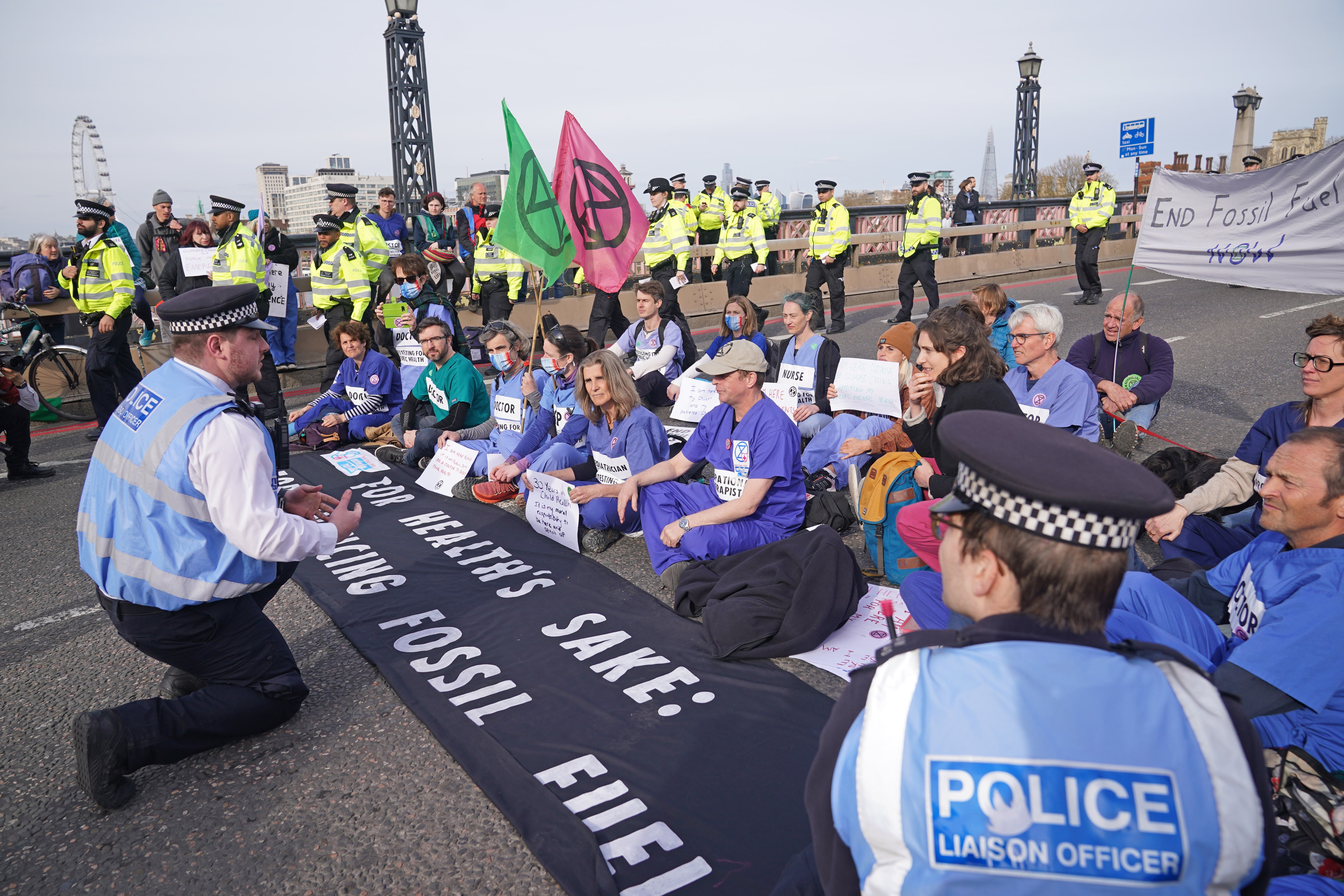‘Authoritarian’ police powers to restrict noisy protests come into force
Controversial laws come into effect including new offence of ‘causing public nuisance’

“Authoritarian” laws allowing police to restrict protests deemed to be too noisy or disruptive have come into force in England and Wales.
Legal conditions can now be imposed on demonstrations if the noise generated “may result in serious disruption to the activities of an organisation which are carried on in the vicinity”, or has a “significant impact” on anyone nearby.
The power to impose restrictions has been extended from moving processions to static assemblies and protests by a lone person.
The Police, Crime, Sentencing and Courts Act also creates a new offence of “intentionally or recklessly causing public nuisance”, including “serious annoyance”, punishable by up to 10 years in prison.
A parliamentary report warned that the crime “may be used to criminalise non-violent protest”, adding: “It is not entirely clear what behaviour the Government and police are trying to tackle with the new offence.”
Ministers cited disruptive environmental protests by Extinction Rebellion and Insulate Britain while pushing for the law, which was returned to MPs several times by the House of Lords before being passed in April.
Priti Patel said the changes would tackle “anti-social guerilla protest tactics”, but the government has already put a new Public Order Bill before parliament.
Proposals in that batch of laws would create “serious disruption prevention orders” to restrict individual protesters, make “locking-on” a criminal offence and allow the suspicionless stop and search of protesters for items that could be used for that purpose.
The new bill would create offences of interfering with key national infrastructure or obstructing major transport works, punishable by imprisonment.
It comes as the government moves to replace the Human Rights Act with a new Bill of Rights, which critics fear will limit freedom of expression.
Charities including Amnesty International and Liberty labelled have labelled the protest laws “authoritarian” and argued that they go against British tradition dating back to the anti-slavery movement, the suffragettes and anti-war marches.
Sam Grant, head of policy and campaigns at Liberty, said: “Protest is a right, not a gift from the state – and measures like these are designed to stop ordinary people making their voices heard.
“From restrictions on protest to scrapping the Human Rights Act, this is all part of the government’s continued attempts to rewrite the rules so only they can win, and prevent ordinary people from having their say.”
Provisions coming into effect on Tuesday also lower the bar for prosecuting protesters for breaching police conditions, and increase the punishment.
Previously, the rules had to be broken “knowingly” for an offence to be committed, but the word has been removed so people can be charged if they “ought to know a condition has been imposed”.
The move has raised practical concerns over how everyone at a demonstration will be made aware of restrictions, which are not always seen when posted on social media by police, or heard when shouted through megaphones by officers.
The maximum sentence for failing to comply with conditions has been increased from three months to a year.
A report by parliament’s Joint Committee on Human Rights said the change amounts to “a disproportionate interference with the right to peaceful protest”, adding: “We do not believe that the need for increased penalties for failing to comply with conditions imposed by the police has been made out.
“There is a real risk that more substantial penalties would have the effect of dissuading people from exercising their right to engage in peaceful protest.”
Other parts of the wide-ranging Police, Crime, Sentencing and Courts Act also came into effect on Tuesday.
They include moves to increase prison sentences for child murderers and abusers, and introduce mandatory life sentences for people who kill emergency workers in the line of duty.
The law creates a new offence of breastfeeding voyeurism punishable by up to two years in prison and extends the prosecution time limit for domestic abuse-related assaults.
It also ends the automatic release of offenders at the halfway point of prison sentences for serious violent and sexual offences such as rape and manslaughter.
Dominic Raab, the justice secretary, said: “From today our new laws will mean serious offenders spend longer in jail, including sex offenders, child abusers and those who kill emergency workers in the course of their duties.
“We are also protecting breastfeeding women from being photographed without their consent and giving the victims of domestic abuse longer to report the crime to the police to help ensure they get justice.”






Join our commenting forum
Join thought-provoking conversations, follow other Independent readers and see their replies
Comments